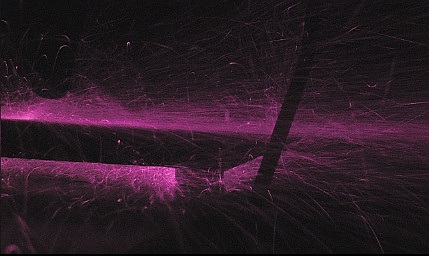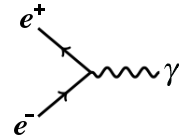Forging the universe
Why is there something instead of nothing? Science, religion, and philosophy have different ideas.
 s our universe eternal and infinite or was it created from nothing fourteen billion
years ago? Both of these ideas are hard for the human mind to grasp.
The idea of creating something from nothing is the inevitable consequence of
a finite universe, but it violates our conviction that everything has
a cause. The expression ex nihilo nihil fit (out of nothing comes nothing)
expresses our confidence in the rule of cause and effect. Philosophy, religion,
and physics have all struggled with this idea.
s our universe eternal and infinite or was it created from nothing fourteen billion
years ago? Both of these ideas are hard for the human mind to grasp.
The idea of creating something from nothing is the inevitable consequence of
a finite universe, but it violates our conviction that everything has
a cause. The expression ex nihilo nihil fit (out of nothing comes nothing)
expresses our confidence in the rule of cause and effect. Philosophy, religion,
and physics have all struggled with this idea.

Philosophy
Philosophers tell us that we cannot speak of nothingness without destroying its pristine nonexistence and bringing ‘something’ into existence. There is a vast literature in philosophy dealing with this, starting with the pre-Socratic philosopher Parmenides:
It is necessary to speak and to think what is; for being is, but nothing is not.
More recently, the French philosopher Alain Badiou wrote at enormous length in his long, nearly unreadable book Being and Event about the so-called null set in mathematics, and proposed Cantor's mathematical set theory as the basis for ontology. In short, his idea was that when we turn a void into a void set we are naming it and thereby calling it into existence.
In this sense, we create things out of nothing all the time. If I say there is no such thing as heavy frakkic mcnibblium and I assert that there are no nockulistic blurflebammers, your imagination automatically creates them and they cease to be nonexistent things, instantly turning me into a liar. Their properties may be ill-defined, and of course they have no existence in the external world, but they still exist as abstract concepts. If we were to claim otherwise, we would also have to deny the existence of other abstractions like ‘freedom’ and ‘existence’.
Religion
Most religions view the universe in one of two ways: it either existed forever, or it was created by speaking it into existence. In Christianity the principle of divine conservation decrees that God must continually exert effort to keep it in existence. If God were to stop thinking about the universe, according to this idea, it would instantly dissolve into nothingness, just as it is with nockulistic blurflebammers when we stop imagining them.
One might suppose, then, that theologians would contend that the universe is a figment of God's imagination. In fact, the Christian Bible is annoyingly vague on the subject. Genesis only says that God created the heavens and the earth, but does not say they were created from nothingness. Indeed, it states that something, i.e. God, was present already, implying that he could have used pre-existing materials. The only verse that makes a claim of creatio ex nihilo is in 2 Maccabees 7:28, where someone says:
I beseech thee, my son, look upon the heaven and the earth, and all that is therein, and consider that God made them of things that were not; and so was mankind made likewise.
This is just one Biblical character talking to another, so it doesn't convince everybody. But a guy named Paul Copan cites a variety of early theologians including the early Gnostics to support the idea that creation from absolute nothingness is fundamental part of Judaism and Christianity. The idea that God merely imposed form on formless matter, he says, came not from the Bible but from the ancient Greeks.
But there is also this:
In the beginning was the word and the word was with God, and the word was God. (John 1:1)
Now, I am no theologian, but in my opinion that sentence is one of the most profound metaphysical statements of all time. Perhaps it might even give us a clue about how the universe works.
There are many contradictory interpretations of this sentence. One that is surprisingly popular is that God's name is ‘The Word.’ Another interpretation is that it's being used in the sense that God's word is law. Like a Mafia don, God put out The Word: obey or else. Another is that the laws of nature and morality preceded creation; they were the blueprint, so to speak, that God used.
Even today words are considered to have great power. Orthodox Jews are still forbidden, for example, to speak the name of God. They believed that the Torah (the five books of Moses) existed before creation. Perhaps, then, those words (all 79,976 of them) are the ‘word’ the verse refers to.
Elsewhere, the Bible says that God is truth itself. In Greek, ‘word’ is logos, which means rational order of things or logic. It also means wisdom. As this guy points out, it could not mean Christ or God himself, because one cannot be with God and be God at the same time (though if one is omnipotent it might not be an insurmountable obstacle).
So, what does it mean? In the beginning there was rational order? What does that mean?
What is wisdom coupled with logic other than consciousness? Could it perhaps be saying that nothingness somehow formed itself into rational order and thence into consciousness?
This latter idea is closer to the thinking of Paul Tillich, who was perhaps the most metaphysical of our modern theologians. He wrote that God is being-itself:
As being-itself God is beyond the contrast of essential and existential being .... Logically, being-itself is ‘before,’‘prior to,’ the split which characterizes finite being. (Vol.1, p.236)
In other words, maybe we shouldn't be so confident that existence and nothingness are the only two alternatives.
Physics
If a gamma ray of sufficient energy passes close to an atom, it spontaneously creates a positron and an electron in a process called pair production. The mass and charge of these particles are always the same. Even if the gamma ray has twice the energy needed, the new electron and positron possess the same mass and charge; the extra energy is simply imparted to the new particles as kinetic energy.
Although not generally recognized as such, this is telling us something quite important about ‘empty’ space. It seems inescapable that it is the properties of space, not the gamma ray itself, that determine what particles can be created.

Electron-positron annihilation. In Feynman diagrams, the 'time' arrow is reversed for antiparticles.
Conversely, if a particle and antiparticle collide, their mass is converted to energy and the particles are destroyed. Quantum field theory describes many types of interactions like this, but in none of them is anything created out of nothingness. Even in the so-called quantum foam, where particles and antiparticles are spontaneously created in empty space, the particles are not created from nothingness. We know that empty space is not a void, but a cauldron bubbling with fields and virtual particles. Lawrence Krauss describes this in his pop physics book A Universe from Nothing.
The common thread in the above—philosophy, theology, and physics—is that there is something already present: a substrate in which something new was created. In some cases that something is a mind. In others it is not-so-empty space.
Creation from nothing may be impossible for us mere humans to even talk about, because we cannot grasp the concept of nothingness. What is it like there, in that place where there is no space, no time, no matter, and no energy? It would have no duration. You could not visit or pass through it, because it has no length. It is impossible to imagine, and it could never be studied scientifically because it literally does not exist.
But is there a loophole in the closed timelike curves that general relativity predicts? Suppose we somehow created a wormhole to the past. If the wormhole was open for a duration equal to the time it reached into the past, we would have created an infinite feedback loop. It would be like microphone squeal, but with no limitations on the amplifier. A single atom, even a photon, passing through would be exponentially reduplicated without limit. Would this not create a big bang? Indeed, maybe somebody already tried it and our universe is the consequence of an experiment in somebody's basement that went horribly wrong. You just know beer had to be involved. Maybe the first words spoken at the moment of creation were not “Let there be light” but “Hey, watch this!”
According to modern physics, space and time were created at the same instant as the universe. After the Big Bang, space immediately began to ‘inflate’, as if the very nature of space is to flatten itself out as much as possible. Some string theorists once proposed that the Big Bang started when strings and anti-strings collided, annihilating both and releasing the pent-up space that had been curled up inside them.
Some versions of modern M-theory, which is the term for the latest, unified version of superstring theory, propose that the universe was created when two colossal five-dimensional structures called branes collided. This is called the ekpyrotic universe model.
The model is still somewhat speculative and highly mathematical, but in the simplest terms, it could be interpreted to say that we are living inside a gigantic train wreck and everything we see around us is fragments of multi-dimensional space that we perceive as matter and energy. If so, the question of whether the branes are eternal would be meaningless, because time itself as it flies past us may just be another piece of the shrapnel.
If this is true, then our universe may be just a tiny speck in an ocean of something that is vastly bigger, and about which we still know almost nothing.

